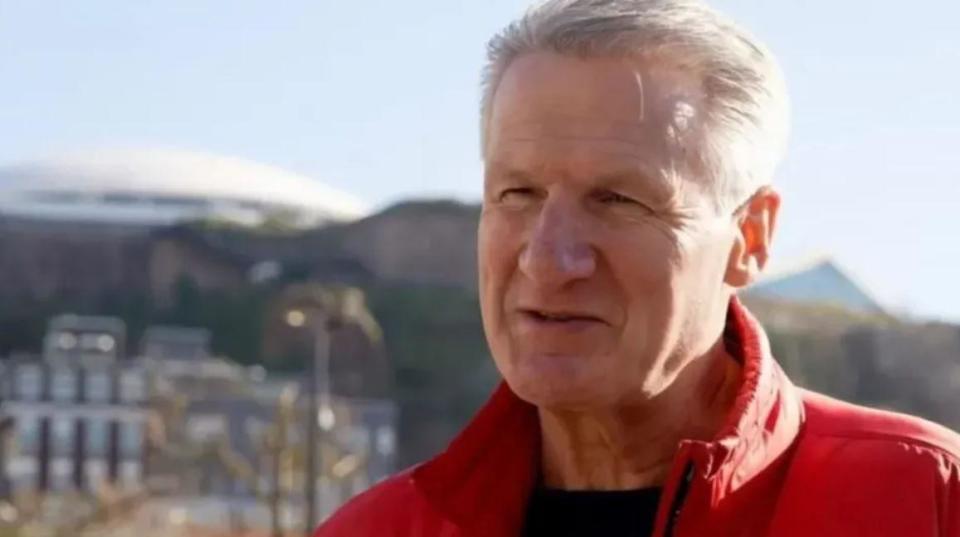Ex-health chiefs would go elsewhere for care
Health experts have told a Jersey scrutiny panel they would go elsewhere for healthcare amid a range of areas marked for improvement and a culture of "denial".
Three former health service leaders, two of whom resigned, spoke to the Health and Social Security Panel.
Intensive care consultant Prof Simon Mackenzie, who led a five-person team responsible for making changes, said: "Knowing what I know, if I were a Jersey resident, I would choose to have my healthcare elsewhere."
Health Minister Deputy Tom Binet said problems were "being dealt with" and that "healthcare is better today than it was yesterday, and it'll be better again tomorrow".
Prof Mackenzie, who resigned in May 2024 as clinical lead of the HCS Change Team, said it was "very common" to criticise the NHS but that the standard of healthcare was "generally lower" in Jersey than the level found in a "similar-sized" NHS hospital.
"It's not to say you can't get good healthcare, there are a lot of good people doing a good job, but I would choose to go elsewhere," he added.
He said the "real challenge was an attitudinal one" and that "if people don't believe there is a problem that needs to be fixed they will not fix it".

Describing concerns with both maternity and medical departments, which he said were underpinned by various external reports and reviews, he said: "A lot of consultants did not accept the findings."
Prof Mackenzie said this "element of denial" made it "very difficult".
He said "several things" needed to happen. These include:
Improved management
More autonomy and accountability for the health service
Better prioritisation of areas for improvement and funding allocation
More networking and collaboration with consultants at other centres in other countries to improve specialisms
Better peer support and alignment with a UK centre
Prof Mackenzie said some patients would be better off seeking some specialist treatment in the UK, while the system "needs a redesign", suggesting either "aligning it formally to a UK centre... with common standards of governance" or "contracting it out" to an organisation.
Tom Hayhoe, who stepped down as chairman of the Health and Community Services (HCS) Advisory Board - set up to oversee the service - in April 2024, also also spoke to the panel.
He left after just one meeting, with Health Minister Deputy Tom Binet citing "differences in working styles".
Mr Hayhoe told the panel the convention was to "cover-up" rather than find solutions, adding: "It's important to report the near-miss and learn from it."
He said Jersey had a "relatively low level" of incident reporting and suggested learning from other countries regarding clinical standards, while consultants should have exchanges with other sites.
Mr Hayhoe said: "If I was living on the island with the means or the insurance policy with any acute health need... I'm afraid I would go off the island."
He said there was "no one he could think of" in Jersey who would be in the "class of care" to get merit awards for the "best and brightest" in the NHS.
Mr Hayhoe said this was "not a criticism" but due to clinicians not being around "leading edge care".
The group of experts on the change team headed up by Prof Mackenzie were brought in after a report by Prof Hugo Mascie-Taylor found serious issues with governance at the hospital and raised major concerns over the management and working culture within the Health Department.
Prof Mascie-Taylor, former interim chair of the HCS Advisory Board, said the "risks were substantial" if Jersey clinicians did not engage with outside clinicians.
He said the "vast majority" of patients in Jersey could be and should be treated safely.
Prof Mascie-Taylor said politicians should "push very hard" for a link between Jersey and a major centre.
He said there was a necessity to "follow best practice", which would require a "cultural change".
Prof Mascie-Taylor spoke of "rugged individualism" within the service, a characteristic he ascribed "most prominently to consultants".
He said it was politicians' task to address this, adding: "I think there's got to be an assertion from the top - by which I mean the chief minister, ministers and the States."
Prof Mascie-Taylor added it would need a "willingness to engage in a certain amount of structural change" across the board - and that the opportunities were "really exciting".
'A complex business'
The health minister said changing culture "will take time" and was "a complex business".
Mr Binet said: "It means having the right strategy and the right people in the right places."
He pointed to a number of actions that he felt would improve the quality of care provided in the hospital.
These included restructuring the service and creating a new health service where policy was decided by the department itself.
He also suggested the current HSC boss's job should be split into two roles, one a head of services and the second the head of the entire hospital service, which he said would deliver "a fully integrated single service that is seamless".
"If I get ill I will be having the treatment they can provide here," he added.
Follow BBC Jersey on X (formerly Twitter) and Facebook. Send your story ideas to channel.islands@bbc.co.uk.


